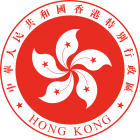Security Bureau (Hong Kong)
| 保安局 | |
 Emblem of the Hong Kong SAR | |
Banner | |
| Agency overview | |
|---|---|
| Formed | 1973 |
| Preceding agencies |
|
| Headquarters | 10th Floor, East Wing, Central Government Offices, 2 Tim Mei Avenue, Tamar, Hong Kong |
| Child agencies | |
| Website | sb |
 |
|
Politics and government of Hong Kong |
|
Related topics |
| Security Bureau | |
|---|---|
| Chinese | 保安局 |
| Hanyu Pinyin | Bǎo'ān Jú |
| Yale Romanization | Bóu ōn guhk |
| Jyutping | Bou2 on1 guk6 |
The Security Bureau (Chinese: 保安局) is a policy bureau of the Government of Hong Kong responsible for policies of the maintenance of law and order, exercising immigration and customs control, rehabilitating offenders and drug abusers, and providing emergency fire and rescue services.
The bureau is headed by the Secretary for Security.
History
[edit]Pre-Handover
[edit]In 1941, it was known as the Defence Branch (Chinese: 防衛科), which was responsible for implementing defence policies for British Hong Kong.[2] In 1973, it was named the Security Branch (Chinese: 保安科).
Post-Handover
[edit]In January 2021, a proposal from the government was announced, where information of airline passengers would be shared with the Immigration Department and passengers could potentially be banned from flying.[3] In response to criticism that it could lead to preventing Hong Kong citizens from leaving the city, the Security Bureau claimed that they would not be affected, and that this would only be for "passenger information on flights heading to Hong Kong, rather than departing flights. The right of Hong Kong residents to enter or leave Hong Kong is not affected."[3]
In February 2021, after reports that the Security Bureau worked with the Correctional Services Department to force prisoners with dual passports to declare a sole nationality, the Security Bureau cited mainland China's nationality laws to explain why consular visits to those prisoners with dual passports might be rejected.[4] A spokesman for the British consulate said they were now "seeking answers from the Hong Kong authorities following the suggestion that they may withdraw our consular access to dual national prisoners and prevent us providing the support we have given since 1997."[4]
In 2022, journalists and members of the legal team representing media tycoon Jimmy Lai internationally received threatening messages purportedly from the Security Bureau and the National Security Department. The Hong Kong police issued a statement condemning acts of impersonation and asked for more information from those involved in order to follow up on the incident.[5]
In August 2022, the Narcotics Division of the Security Bureau said it that any amount of THC is illegal in the city. Hong Kong authorities subsequently outlawed CBD, saying that it can be converted into THC and many products came contaminated with the chemical. Whether CBD has medicinal effects is debated.[6][7]
Subordinate entities
[edit]The following public entities are controlled by the bureau:
- Hong Kong Police Force
- Hong Kong Fire Services Department
- Correctional Services Department
- Customs and Excise Department
- Immigration Department
- Government Flying Service
- Civil Aid Service
- Auxiliary Medical Services
- Narcotics Division
See also
[edit]References
[edit]- ^ "Name List of Permanent Secretaries and Heads of Government Departments". Retrieved 11 November 2012.
- ^ https://www.watershedhk.com/%E9%A6%99%E6%B8%AF%E4%BF%9D%E8%A1%9B%E6%88%B0%E5%8B%B3%E7%AB%A0%E8%AA%AC%E6%95%85%E4%BA%8B%EF%BC%9A%E9%98%B2%E8%A1%9B%E5%8F%B8%E5%82%85%E7%91%9E%E6%86%B2-%E5%AF%A7%E6%AD%BB%E4%B8%8D%E5%B1%88/
- ^ a b "New rules 'won't affect people's right to leave HK' - RTHK". news.rthk.hk. Retrieved 13 February 2021.
- ^ a b "West sounds alarm over consular access in HK - RTHK". news.rthk.hk. Retrieved 4 February 2021.
- ^ "Hong Kong police slam fake 'National Security Wing' email sent to Lai lawyers". South China Morning Post. 8 July 2022. Retrieved 20 October 2023.
- ^ Leung, Hillary (21 August 2022). "Hong Kong's zero-tolerance approach to drugs leaves budding CBD industry high and dry". Hong Kong Free Press HKFP. Retrieved 21 August 2022.
- ^ "Hong Kong's New CBD Ban Reinforces Asia's Strict Drug Approach". Time. 1 February 2023. Retrieved 20 October 2023.
